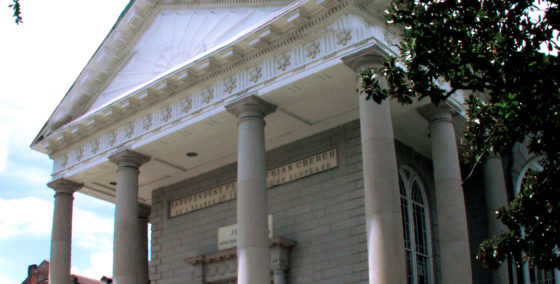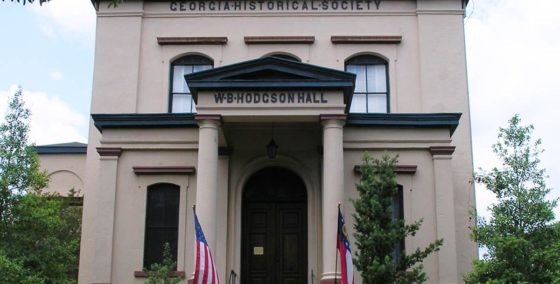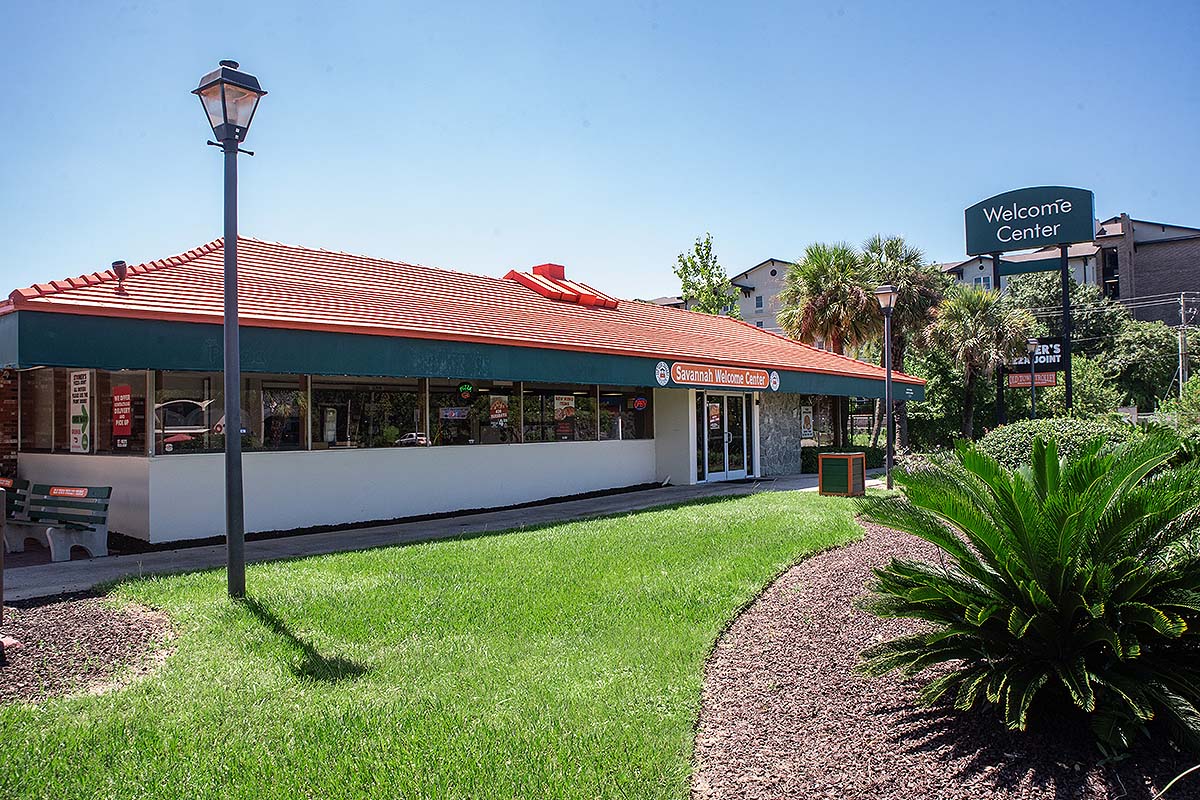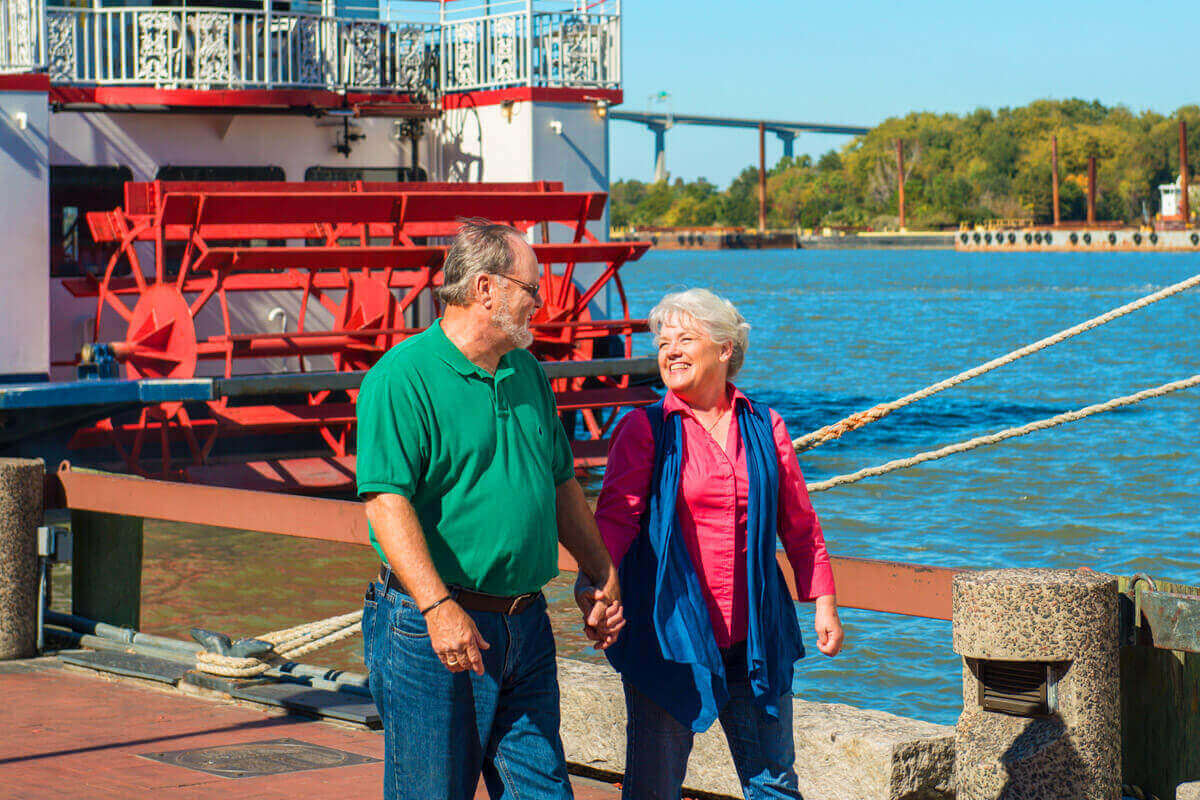Old Savannah Distillery
234 Martin Luther King Jr Blvd, Savannah, GA 31401
Stop #1 is located on Perry Street right next to the new Old Savannah Distillery.
Franklin Square
15 Montgomery Street
Montgomery Street and West Bryan
Stop 2 is located adjacent to the Double Tree Hotel on the corner of Montgomery Street and Bryant Street. The First African Baptist Church is located on the northwest side of Franklin Square just a half block behind stop #2.
Juliette Gordon Low Birthplace Museum
10 East Oglethorpe Avenue
Stop #3 is located in front of the Juliette Gordon Low Birthplace home. The home is located at the corner of Bull streets and Oglethorpe avenue.
Madison Square
6 W Harris St, Savannah, GA 31401, USA
West Harris and Bull Streets
Stop 4 Is adjacent to The Sorrel-Weed House. The Desoto Hilton is across the street.
Forsyth Park
700 Drayton St, Savannah, GA 31401, USA
Stop #5 is adjacent to The Mansion on Forsyth and across from Forsyth Park. Look for the blue and white trolley sign.
Taylor Square
207 E Gordon St, Savannah, GA 31401
Stop #6 is located in front of Massie Heritage Museum.
Ralph Mark Gilbert Civil Rights Museum
460 Martin Luther King Jr Blvd
Stop # 7 is located on the corner of Alice Street and MLK. The stop will be in front of the Civil Rights Museum. Look for the trolley stop sign!
Visitors Center
301 Martin Luther King Jr Blvd, Savannah, GA 31401
Tickets Sold at this Stop
Martin Luther King Jr. Blvd. and Liberty Street
Stop 8 is located on the northwest corner of Martin Luther King Jr. Blvd. and Louisville/Liberty streets. it is directly across the street from the Old Town Trolley Carbarn depot.
Old Town Trolley Welcome Center
214 W Boundary St, Savannah, GA 31401, USA
Tickets Sold at this Stop
West Boundary Street and Oglethorpe Avenue
Stop 9 is located off of West Boundary and Oglethorpe Avenue at the foot of the Talmadge Bridge at the beginning of the historic district.
City Market
28-32 Jefferson St, Savannah, GA 31401, USA
Tickets Sold at this Stop
Jefferson and West Bryan streets
Stop 10 is is located directly in the center of City Market right in front of our Trolley Stop Gift Shop.
Christ Church Parish House
18 Abercorn St.
Stop # 11 is located off of Reynolds Square, on the corner of Bryan Street and Abercorn Street. It is directly across the square from the Lucas Theater going towards Bay Street.
River Street
301 River Street, Savannah, GA 31401, USA
Tickets Sold at this Stop
East River Street and the Lincoln street ramp
Stop 12 is directly in front of the Simply Savannah Gift Shop just off of East River Street and the Lincoln street ramp. The Boar's Head Restaurant is less than fifty yards away.
River Street Market Place
502 E River St.
Stop #13 is located on the opposite side of River Street as Stop #12. It is a little further than midway between Stop #12 and Stop #14, just past Five and Dime General Store. Look for our Orange and Green Sales Booth!
The Waving Girl
531 E River St, Savannah, GA 31401
East end of River St. in Morrell Park
Stop 14 is located at the bottom of the East Broad ramp right across the street from the Olympic Cauldron Monument. Look for the purple and green sign.
Davenport House
107 Habersham Street
Stop #15 is located at the side entrance of the Davenport House Museum, at the corner of East State Street and Habersham Street.
Cathedral of St. John The Baptist
313 Abercorn St, Savannah, GA 31401, USA
Liberty and Abercorn streets
Stop 16 is located in front of Cathedral of Saint John The Baptist. The Andrew Low House is just 500 yards away to the south off of Lafayette Square.
Old Savannah Distillery
234 Martin Luther King Jr Blvd, Savannah, GA 31401Stop #1 is located on Perry Street right next to the new Old Savannah Distillery.
Franklin Square
15 Montgomery StreetMontgomery Street and West Bryan
Stop 2 is located adjacent to the Double Tree Hotel on the corner of Montgomery Street and Bryant Street. The First African Baptist Church is located on the northwest side of Franklin Square just a half block behind stop #2.
Juliette Gordon Low Birthplace Museum
10 East Oglethorpe AvenueStop #3 is located in front of the Juliette Gordon Low Birthplace home. The home is located at the corner of Bull streets and Oglethorpe avenue.
Madison Square
6 W Harris St, Savannah, GA 31401, USAWest Harris and Bull Streets
Stop 4 Is adjacent to The Sorrel-Weed House. The Desoto Hilton is across the street.
Forsyth Park
700 Drayton St, Savannah, GA 31401, USAStop #5 is adjacent to The Mansion on Forsyth and across from Forsyth Park. Look for the blue and white trolley sign.
Taylor Square
207 E Gordon St, Savannah, GA 31401Stop #6 is located in front of Massie Heritage Museum.
Ralph Mark Gilbert Civil Rights Museum
460 Martin Luther King Jr BlvdStop # 7 is located on the corner of Alice Street and MLK. The stop will be in front of the Civil Rights Museum. Look for the trolley stop sign!
Visitors Center
301 Martin Luther King Jr Blvd, Savannah, GA 31401Tickets Sold at this Stop
Martin Luther King Jr. Blvd. and Liberty Street
Stop 8 is located on the northwest corner of Martin Luther King Jr. Blvd. and Louisville/Liberty streets. it is directly across the street from the Old Town Trolley Carbarn depot.
Old Town Trolley Welcome Center
214 W Boundary St, Savannah, GA 31401, USATickets Sold at this Stop
West Boundary Street and Oglethorpe Avenue
Stop 9 is located off of West Boundary and Oglethorpe Avenue at the foot of the Talmadge Bridge at the beginning of the historic district.
City Market
28-32 Jefferson St, Savannah, GA 31401, USATickets Sold at this Stop
Jefferson and West Bryan streets
Stop 10 is is located directly in the center of City Market right in front of our Trolley Stop Gift Shop.
Christ Church Parish House
18 Abercorn St.Stop # 11 is located off of Reynolds Square, on the corner of Bryan Street and Abercorn Street. It is directly across the square from the Lucas Theater going towards Bay Street.
River Street
301 River Street, Savannah, GA 31401, USATickets Sold at this Stop
East River Street and the Lincoln street ramp
Stop 12 is directly in front of the Simply Savannah Gift Shop just off of East River Street and the Lincoln street ramp. The Boar's Head Restaurant is less than fifty yards away.
River Street Market Place
502 E River St.Stop #13 is located on the opposite side of River Street as Stop #12. It is a little further than midway between Stop #12 and Stop #14, just past Five and Dime General Store. Look for our Orange and Green Sales Booth!
The Waving Girl
531 E River St, Savannah, GA 31401East end of River St. in Morrell Park
Stop 14 is located at the bottom of the East Broad ramp right across the street from the Olympic Cauldron Monument. Look for the purple and green sign.
Davenport House
107 Habersham StreetStop #15 is located at the side entrance of the Davenport House Museum, at the corner of East State Street and Habersham Street.
Cathedral of St. John The Baptist
313 Abercorn St, Savannah, GA 31401, USALiberty and Abercorn streets
Stop 16 is located in front of Cathedral of Saint John The Baptist. The Andrew Low House is just 500 yards away to the south off of Lafayette Square.
- Trolley Route

- Stops

- Parking

- Ticket Booths

Old Savannah Distillery
Attractions to explore near this stop
Share with your friends!
Attractions to explore near this stop
Southern Spirits Emporium
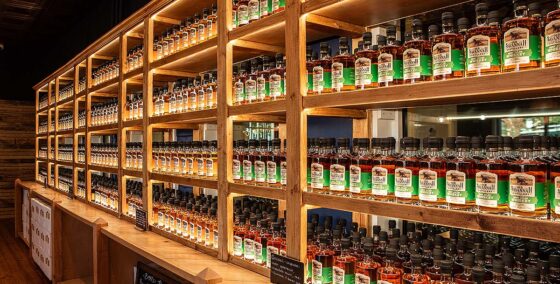
Southern Spirits Emporium is an upcoming attraction that celebrates the flavors and culture of the South. Plans are still in the works, but visitors can expect a space filled with stories, hospitality, and unique offerings. It’ll be a place where guests can slow down, sample something special, and enjoy Savannah’s warm charm.
Stay tuned for more information!
-
Shopping
-
Entertainment
-
Restrooms
Ghost Hunters of Savannah Paranormal Investigation
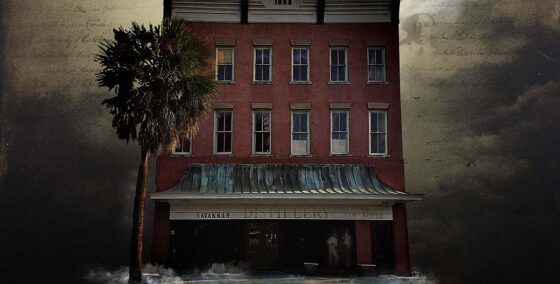
For those seeking a thrilling and unique experience, a ghost hunt at 416 West Liberty St. in Savannah is a must. This two-hour immersive paranormal investigation takes you inside one of Savannah’s most haunted locations. Equipped with professional ghost-hunting tools, participants explore the property while learning about its eerie history and reported hauntings. It’s a spine-chilling activity that highlights Savannah’s rich and mysterious past, perfect for those looking to uncover the city’s supernatural side.
Franklin Square
Attractions to explore near this stop
Share with your friends!
Attractions to explore near this stop
American Prohibition Museum and Congress Street Up
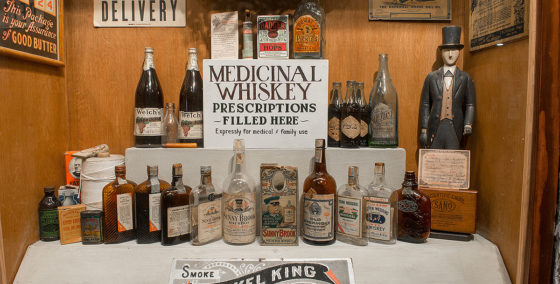
Located in Savannah’s popular City Market, the American Prohibition Museum is the first and only museum in the United States dedicated to the history of Prohibition. Highlighting an era of gangsters, rum runners, and flappers, the museum brings the Roaring Twenties to life with over 20 intoxicating exhibits and an authentic speakeasy. Featuring 21st century technology and immersive displays, the museum takes guests on a journey through the past to the early 1900s when anti-alcohol rallies swept the nation and America’s struggle with alcohol was brought to light.
-
Admissions
-
Entertainment
-
Restrooms
Savannah Pirates and Treasure Museum
Plant Riverside District
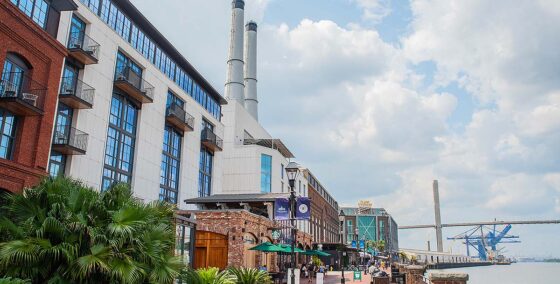
Plant Riverside District was once a 1912 power plant that supplied electricity to Savannah. Today, the restored site is one of the city’s busiest riverfront destinations. Visitors can explore restaurants, rooftop bars, boutique shops, and a hotel that blends into the original industrial design. Inside, there are displays of fossils, minerals, and even a life-sized chrome dinosaur sculpture. Outside, open courtyards often host concerts, art shows, and seasonal festivals, making the west end of River Street a lively place to gather.
-
Shopping
-
Dining
-
Entertainment
-
Restrooms
Jepson Center for the Arts
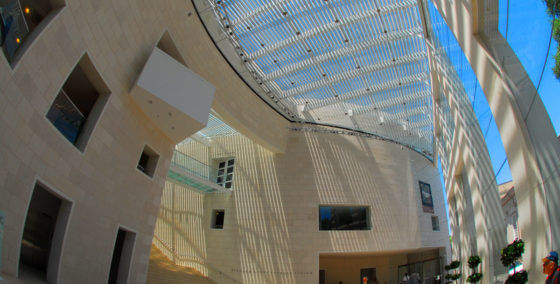
Located at 207 York Street, this modern building stands out among the many historic buildings in the area. A part of the Telfair Museums, the Jepson Center for The Arts lures visitors in with an extensive collection of artwork, an interactive children’s museum and a charming café. Enjoy a relaxing lunch as the sunlight fills the room in the center of the museum that overlooks the square. Temporary and permanent exhibits showcase everything from photography to sculpture, making it a great outing for art enthusiasts and adults and children of all ages.
-
Dining
-
Entertainment
-
Restrooms
The Telfair Museum of Art: Savannah's Cultural Gem
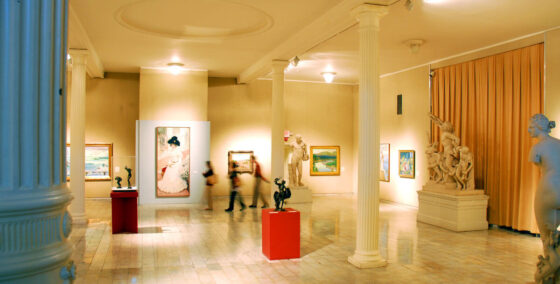
The Telfair Museum of Art, located in Savannah’s historic district, stands as a shining example of the city’s cultural and historical richness. Established in 1886, it holds the honor of being the oldest public art museum in the Southern United States. Spanning three distinct sites — the Telfair Academy, the Jepson Center, and the Owens-Thomas House & Slave Quarters — this museum offers visitors a unique and multifaceted journey through art, history, and architecture.
-
Admissions
-
Entertainment
-
Restrooms
First African Baptist Church
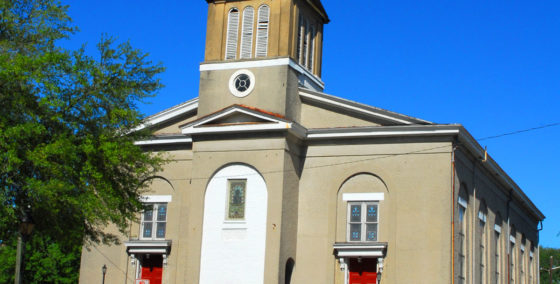
A registered historic landmark in the National Registry of Historic Landmarks and Places, the First African Baptist Church was organized in 1773. This magnificent Savannah landmark still contains many of its original elements including several stained glass windows, light fixtures, the baptismal pool and the 1832 Pipe Organ. The pews in the balcony were made by slaves and are nailed on to the floor; you can still see the markings they made in the African dialect known as “Cursive Hebrew”. Come for a visit or to enjoy a Sunday service. Be sure to look up at the “Nine Patch Quilt” design on the ceiling – a symbol that the church was a safe house for slaves.
 Franklin Square
Franklin Square
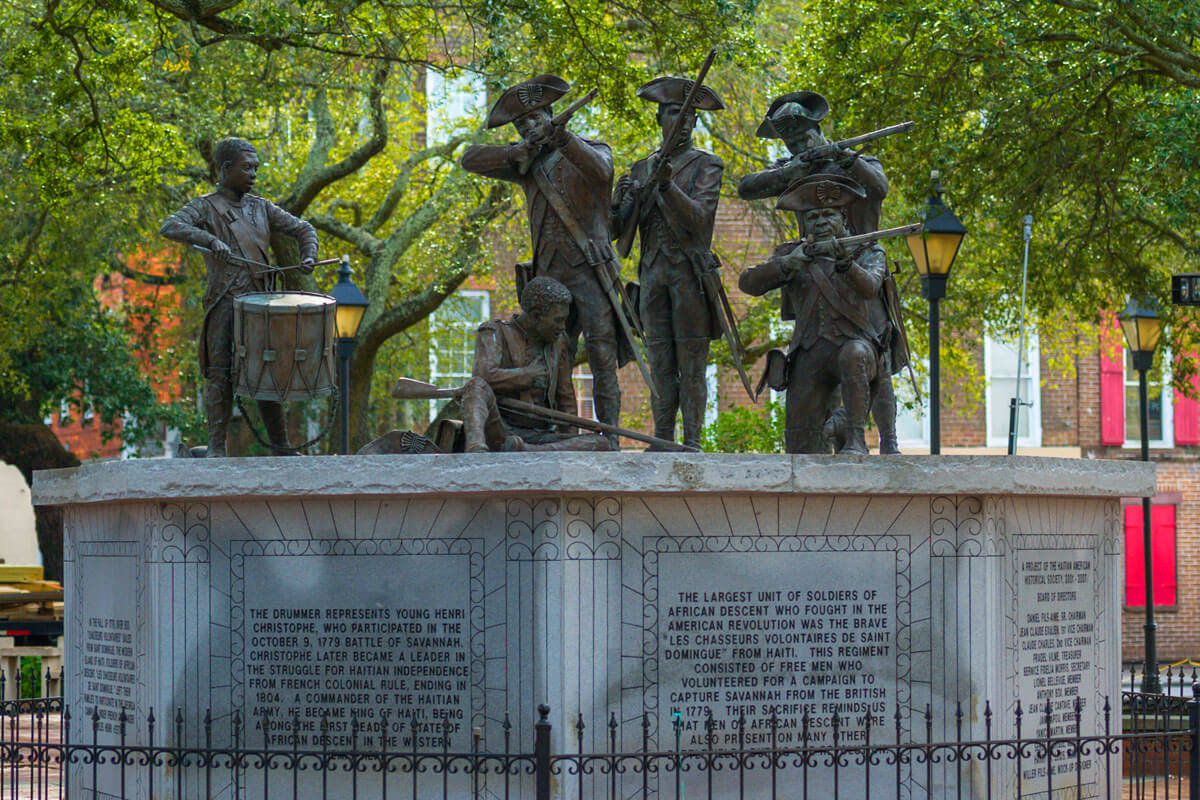
Franklin Square was created in 1791 and was named in honor of Benjamin Franklin who was an agent for the Colony of Georgia from 1768 to 1775. In those days, the square was referred to as Water Tank Square, Water Tower Square and the Reservoir Square, because it was the site of the city’s water supply. The square is located at the Western End of City Market, where visitors can find distinctive shops, antiques and fabulous dining experiences.
-
 Shopping
Shopping -
 Dining
Dining -
 Restrooms
Restrooms
Juliette Gordon Low Birthplace
Attractions to explore near this stop
Share with your friends!
Attractions to explore near this stop
Bull Street Corridor
Complete Guide To Chippewa Square
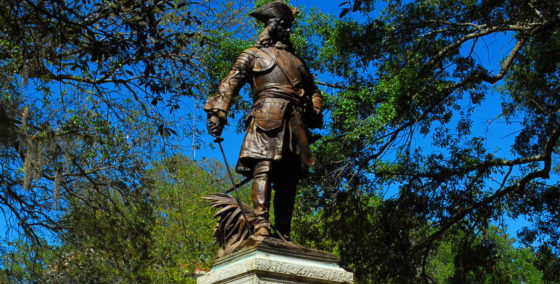
Laid out in 1812 to honor the soldiers who lost their lives in the War of 1812, Chippewa Square is one of Savannah’s most well-known squares, and not just because it was featured in the blockbuster movie Forrest Gump! The 15th square to be established in the city, Chippewa is located between Hull and Perry Streets, which puts it close to many of Savannah’s most popular sights and attractions; in fact, it’s known by many as “the gateway” square. This lovely square boasts towering oaks and tranquil spots with benches to sit and admire the view. To help you plan your Savannah vacation, here’s a guide to all you can see and do in and around Chippewa Square.
-
Shopping
-
Dining
Savannah Theatre
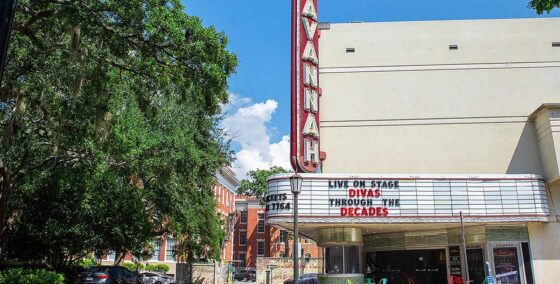
The Historic Savannah Theatre has been part of the city’s history since 1818, making it one of the oldest working theaters in the United States. Located on Chippewa Square, the glowing marquee has long welcomed audiences for musicals, concerts, and comedy shows in a cozy, inviting setting.
The theatre is also tied to Savannah’s pop culture history as the backdrop for the famous bench scenes in the Academy Award–winning film Forrest Gump. While the original bench now rests in the Savannah History Museum, visitors still stop by Chippewa Square to see where those scenes were filmed. With its blend of live entertainment and historic charm, the Historic Savannah Theatre remains one of Savannah’s most iconic landmarks.
-
Admissions
-
Entertainment
-
Restrooms
Big Duke City Fire Bell
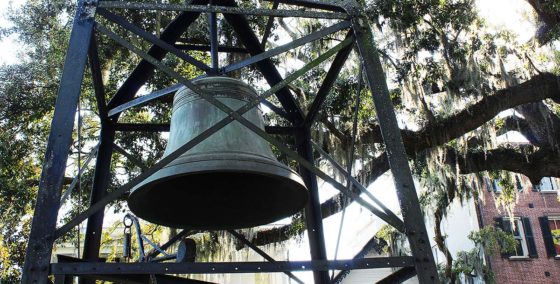
Originally constructed in 1872 as a fire alarm bell for the city of Savannah, Big Duke Bell is a unique historical landmark in the Chatham community. The iconic bell was given its fun nickname in honor of Alderman Marmaduke Hamilton, chairman of the City Council Fire Committee (1871–73), when the bell was purchased. Although Big Duke Bell was built as a fire alarm, it evolved into a general alarm for police and military. Big Duke was also used to announce special occasions, such as the end of the Spanish–American War and honoring our troops upon their returns from various wars. In 1985, Big Duke was officially retired from its original purpose and moved into a memorial for all local firefighters.
 Juliette Gordon Low Birthplace
Juliette Gordon Low Birthplace
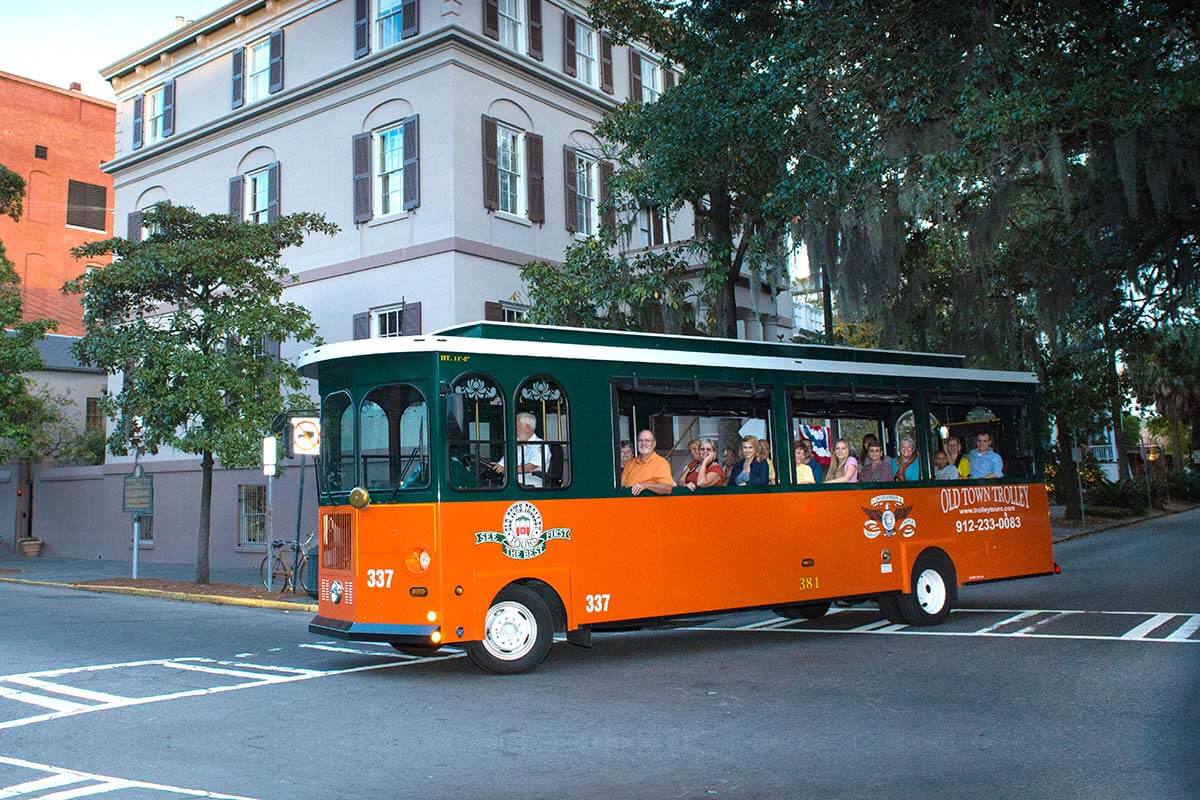
Juliette Gordon Low was born in a Georgian mansion in the historic district of the city. Her birthplace, the city’s first National Historic Landmark, is now a museum dedicated to her life and the Girl Scouts of America and is visited by thousands of people each year. Step Inside For a Historic Journey. Juliette Gordon Low was born on October 31, 1860 in an English Regency style mansion located in Savannah. It’s here that visitors can now learn about her remarkable life and her founding of the Girl Scouts.
-
 Admissions
Admissions
Madison Square
Attractions to explore near this stop
Share with your friends!
Attractions to explore near this stop
Sorrel-Weed House
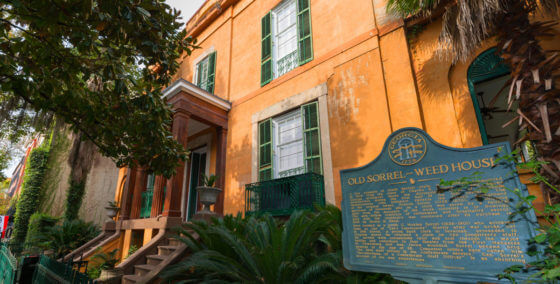
Constructed between 1835 and 1840 by Charles Cluskey, this Savannah historic landmark and museum is considered to be one of the finest examples of Greek Revival and Regency architecture in the area. The Sorrel-Weed House was constructed for Francis Sorrel, who was a prominent commission merchant to the West Indies. Many well known people have visited the home, including General Robert E. Lee, who was a long standing friend of Francis Sorrel.
-
Admissions
-
Restrooms
Green-Meldrim House
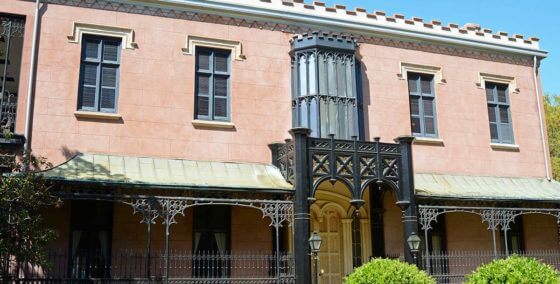
Situated on Madison Square, the Green-Meldrim House was built in 1850 for cotton merchant Charles Green. In 1892 the home was purchased by Judge Peter Meldrim whose heirs later sold it to St. John’s Episcopal Church. The home’s amazing past includes a brief residency by General Sherman after he took the city in 1864.
-
Admissions
-
Restrooms
Mrs. Wilkes Boarding House
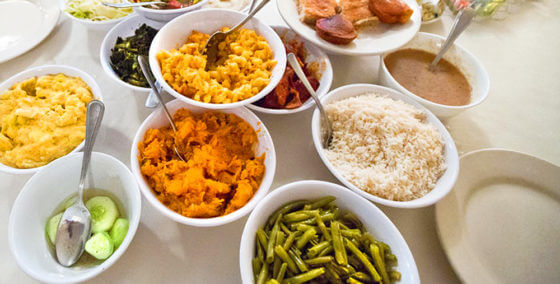
For a true taste of Savannah, stop in at Mrs. Wilkes Boarding House. Set in an old brick building that dates back to 1870, this is one of Savannah’s legendary spots. Mrs. Wilkes passed away in 2003 and although she had not taken in any boarders in around 40 years, her hometown cooking and hospitality continue on. The famous dining room is so popular that although the sign is not visible from the road, hungry tourists and locals alike begin lining up before the restaurant even opens every morning. Serving up family-style meals at large tables, Mrs. Wilkes Boarding House delights guests with traditional down home fried chicken, gumbo, creamed corn, Savannah red rice, biscuits and more. Come hungry and ready to dine alongside of folks you may not know; because at Mrs. Wilkes, everyone is family and is seated together at large 10-top tables.
-
Admissions
-
Shopping
-
Dining
-
Restrooms
Six Pence Pub
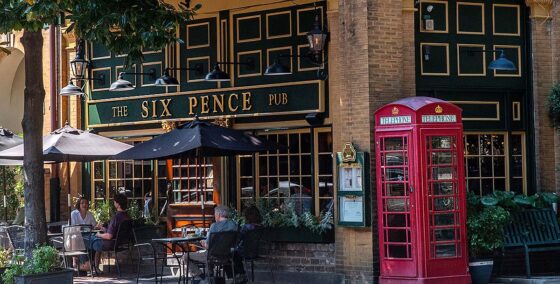
Six Pence Pub has been part of Savannah’s Historic District for many years and is known for its warm, English-style setting. A red phone booth and Union Jack flags mark the entrance, while inside guests find wood-paneled walls and classic pub décor. The menu includes favorites like shepherd’s pie, bangers and mash, and fish and chips, paired with imported beers and ciders. The pub appeared in the 1995 film Something to Talk About, and it has also gained a reputation for ghost stories told by staff and regulars.
-
Dining
-
Restrooms
SCADstory and Store
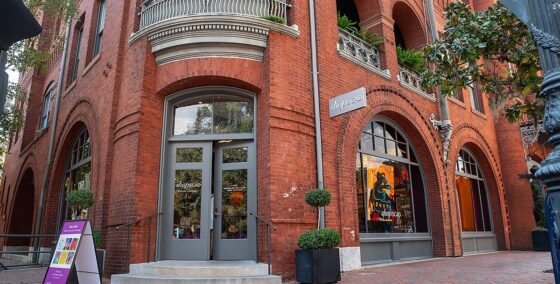
SCADstory is an immersive 4-D show created by the Savannah College of Art and Design. Using lights, sound, and special effects, the experience tells the story of the university’s founding in 1978 and the achievements of its students and alumni. The show takes place in Poetter Hall, SCAD’s original 1892 building. After the presentation, visitors can stop by the SCAD store, where artwork, jewelry, fashion, and design pieces made by students and graduates are available to purchase.
-
Admissions
-
Shopping
-
Entertainment
Forsyth Park
Attractions to explore near this stop
Share with your friends!
Attractions to explore near this stop
Victorian District
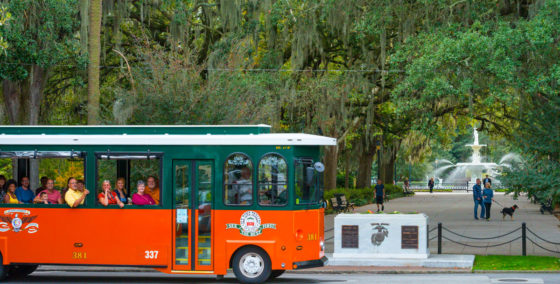
With more than 20 city squares filled with monuments, mansions, museums, churches and famous forts of the Revolutionary & Civil War eras, Savannah boats the largest National Historic Landmark District in the United States. Just a stone’s throw from this exceptional locale is Savannah’s Victorian District. It’s home to some of the finest architecture in the South complete with whimsical, two-story residences adorned with gingerbread trim, stained-glass windows and other unique details.
Georgia Historical Society
 Forsyth Park
Forsyth Park
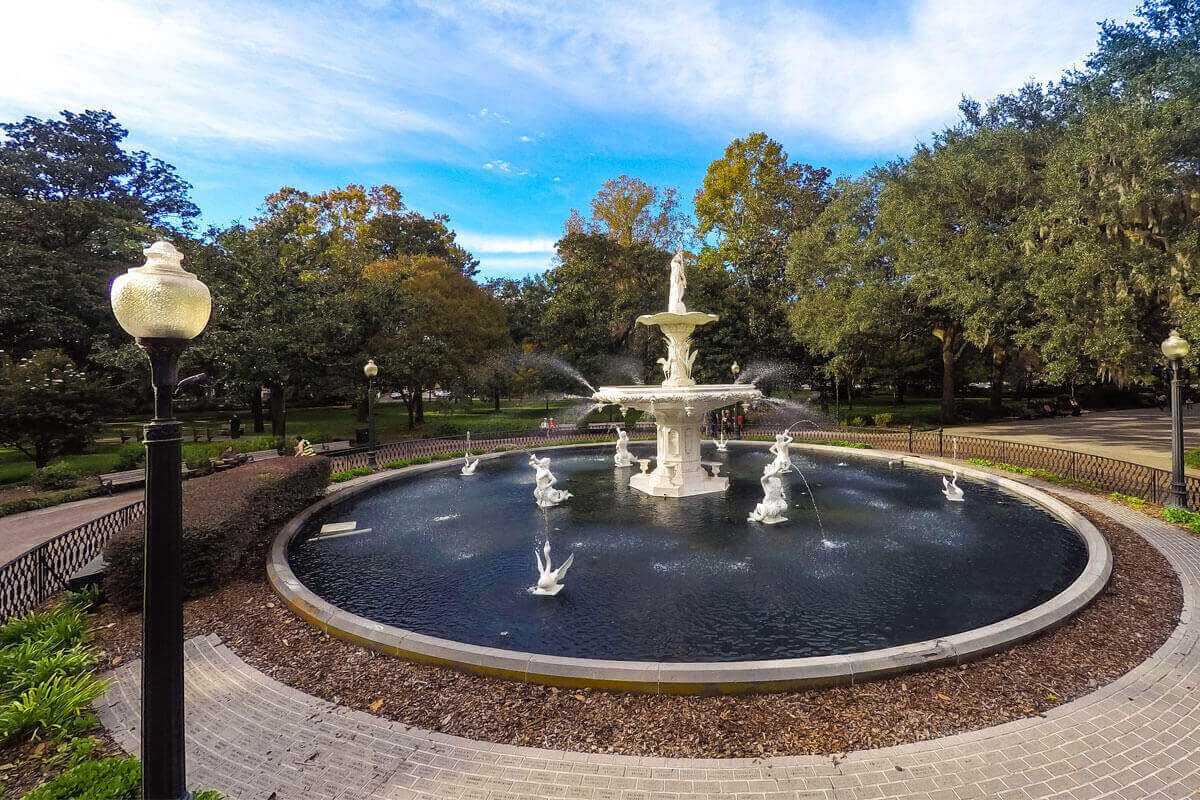
From its very beginning, locals and visitors to Savannah have flocked to Forsyth Park for its unique blend of natural beauty, history and attractions. It’s the largest and oldest park in Savannah, spanning 30-acres and is where adults, youth, families and people of all ages come to see the sights, run, play and relax. Often the setting for football and Frisbee games, skateboarders, walkers and joggers also love the gorgeous ambiance of Forsyth Park. For those with an interest in History, Forsyth has more than its share.
Taylor Square
Attractions to explore near this stop
Share with your friends!
Attractions to explore near this stop
Massie Heritage Museum
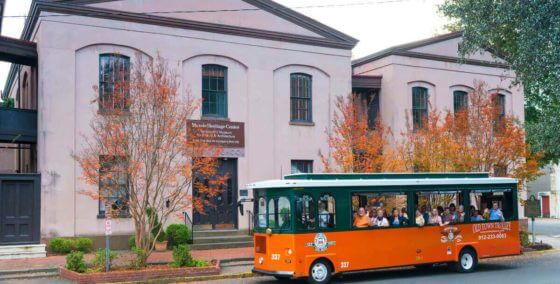
Massie School opened in 1856 as Savannah’s first free public school, operating continuously except for its use as a Union hospital during the Civil War Federal occupation of the city and as a Freedmen’s school during Reconstruction. Closed as a regular school in 1974, Massie reopened in 1977 as a teaching museum for history and architecture with programs attracting visitors of all ages, serving over 20,000 visitors last year. A local school system property, the site hosts exhibitions and programs throughout the year.
-
Admissions
-
Entertainment
-
Restrooms
Clary's Restaurant
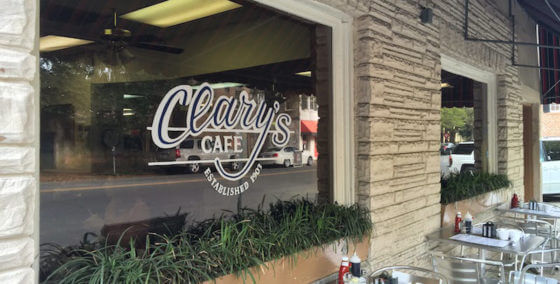
If you have ever visited Clary’s Café, then you know that they’re about far more than the food. It is a place full of nostalgia and intriguing characters. It is a colorful mosaic of times and people and the bonds that have formed throughout the years. The feelings of home and family are evident when you walk through the door. As you look around at all of the knickknacks, paintings, family pictures and memorabilia that form its décor, you may wonder how a drugstore could have evolved into what you see now… World Famous Clary’s Café. Remember, We serve breakfast all day!
-
Dining
-
Restrooms
Mercer-Williams House
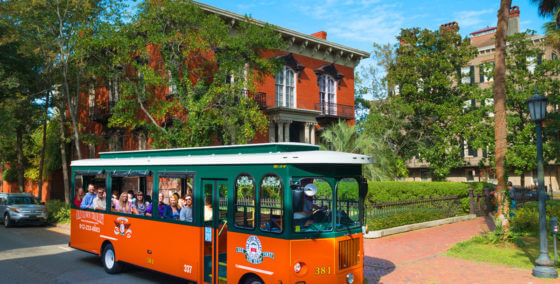
For those who enjoy history and exquisite architecture, the Mercer-Williams House is a must see. After a century of prominent residents, the house was purchased by famed Savannah preservationist Jim Williams. Williams spent two years restoring the Mercer House and today guests can take tours to experience its sophisticated charm. Furniture and art from William’s private collection are on display including 18th and 19th century portraits, drawings and a collection of Chinese porcelain.
-
Admissions
-
Restrooms
Jones Street
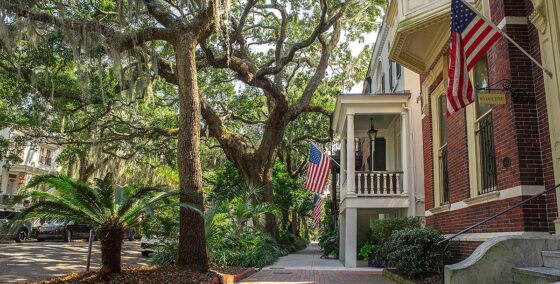
Jones Street is one of the most admired streets in Savannah, known for its oak-shaded sidewalks and 19th-century homes. Many of the houses reflect Greek Revival and Italianate styles, with wide steps, ironwork balconies, and brick facades. The western part of the street still has its original red brick paving, preserved from the mid-1800s. Gas lamps line the street, adding to the timeless character that makes it a favorite place for photos and quiet walks.
 Taylor Square
Taylor Square
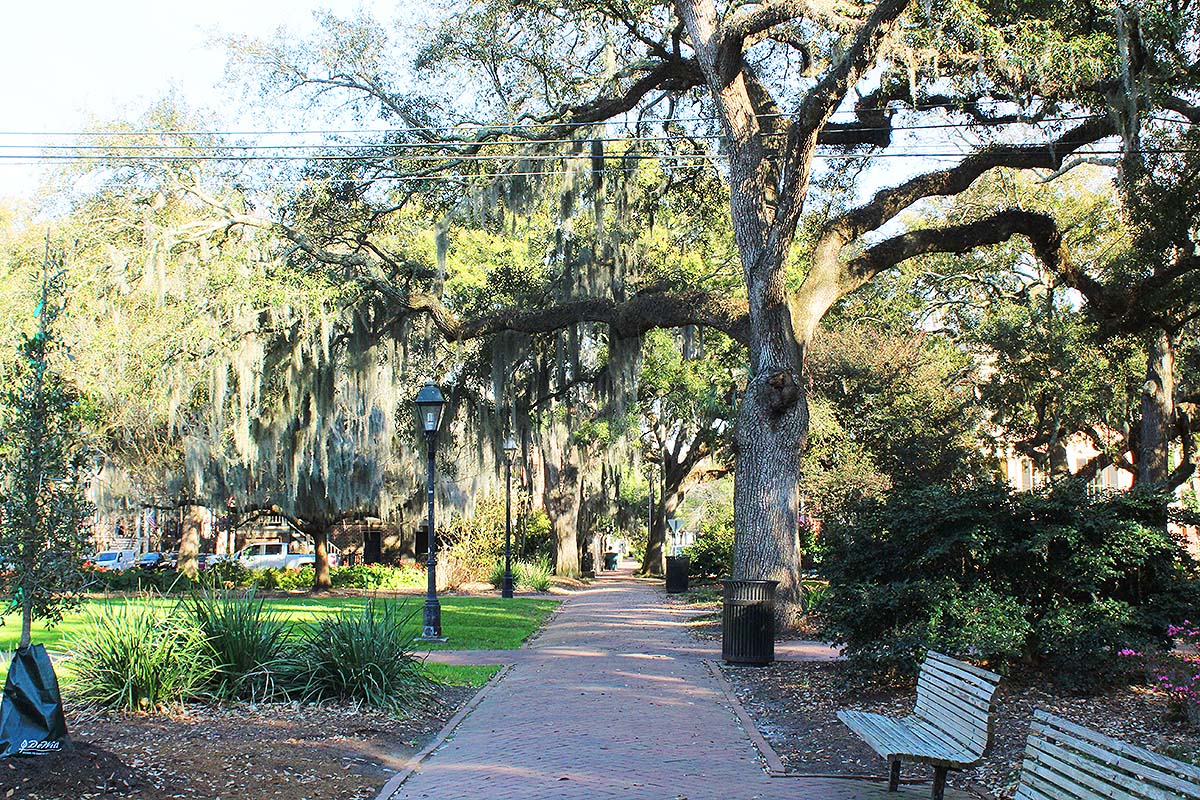
Walking through Taylor Square is like walking through Savannah’s rich past. Taylor Square still retains all of its original structures from the 1850s and 1860s. The old Massie School House, built soon after the square was laid out, and the imposing Wesley Monumental United Methodist Church are still nestled in Taylor Square today. Like most parks in Savannah, Taylor Square has only become lusher with beautiful landscape throughout the years, providing plenty of shade along the brick stone walkways.
Ralph Mark Gilbert Civil Rights Museum
Attractions to explore near this stop
Share with your friends!
Attractions to explore near this stop
Gray's Reef Ocean Discovery Center
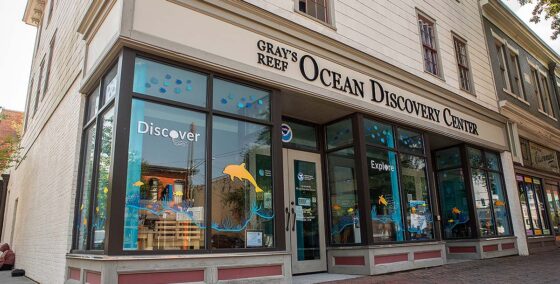
The Gray’s Reef Ocean Discovery Center brings the ocean to downtown Savannah with exhibits that highlight one of the nation’s most remarkable marine sanctuaries. Guests can learn about reef habitats filled with marine life, try hands-on activities, and take virtual dives that reveal the beauty beneath the waves. The center also shares ways each visitor can help protect the ocean, making the experience both fun and meaningful.
The Discovery Store, presented by the Coastal Heritage Society, features ocean-friendly toys, books, and gifts that support conservation efforts. The Discovery Center regularly installs new exhibits and programs, so experiences may vary throughout the year, and returning visitors often find something new to explore.
-
Admissions
-
Shopping
-
Restrooms
Visitors Center
Attractions to explore near this stop
Share with your friends!
Attractions to explore near this stop
Savannah History Museum
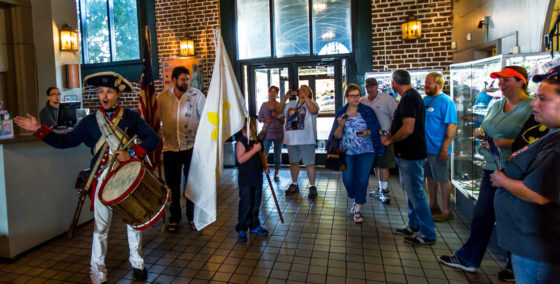
Located inside the Savannah Visitor Information Center, The Savannah History Museum gives visitors a look into the city’s fascinating past from 1733 to the present day. Take your time as you stroll through a variety of exhibits that chronicle the many events and people that have shaped this grand city.
-
Admissions
-
Entertainment
Roundhouse Railroad Museum
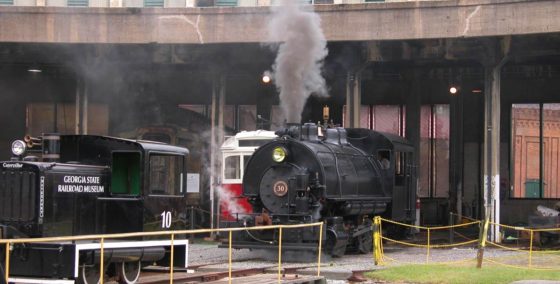
Originally the site of the Central Georgia Railway Headquarters, the Roundhouse Railroad Museum was considered to be the most up-to-date, revolutionary facility of its time. Handling freight, passengers, maintenance and manufacturing at this single location, the Railway Headquarters was an indispensable site for a number of years. After being abandoned in the 1960’s, several local enthusiasts worked to save the buildings from destruction and today the railway is a National Historic Landmark, a “Save America’s Treasures” Site, and Georgia’s State Railroad Museum.
-
Admissions
-
Entertainment
-
Restrooms
Savannah Children's Museum
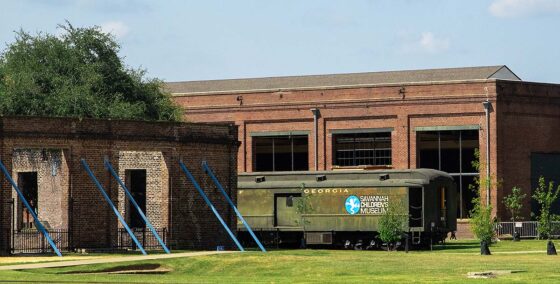
The Savannah Children’s Museum is located in the preserved ruins of the Central of Georgia Railway carpentry shop. The outdoor space features more than a dozen hands-on exhibits, including a sensory garden, exploration maze, puppet theater, and reading nook built into the old brick walls. Staff lead daily programs tied to science, art, and storytelling, and museum mascots like Tippy the Tortoise often make special appearances to delight visitors.
-
Admissions
-
Shopping
-
Restrooms
Battlefield Park
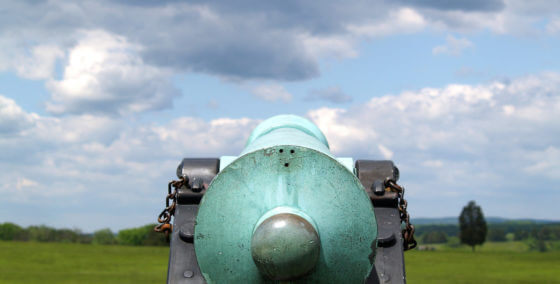
On October 9, 1779, the French, Haitians and American troops battled against the British soldiers who were defending Savannah. The battle ended with Britain still holding on to the city and more than 800 troops from each side either wounded or killed. Many of the dead were buried on the spot with no monuments to mark their graves. Today, Coastal Heritage Society is working to create a moving memorial in tribute to the many soldiers who lost their lives in the battle of Savannah.
 Visitors Center
Visitors Center
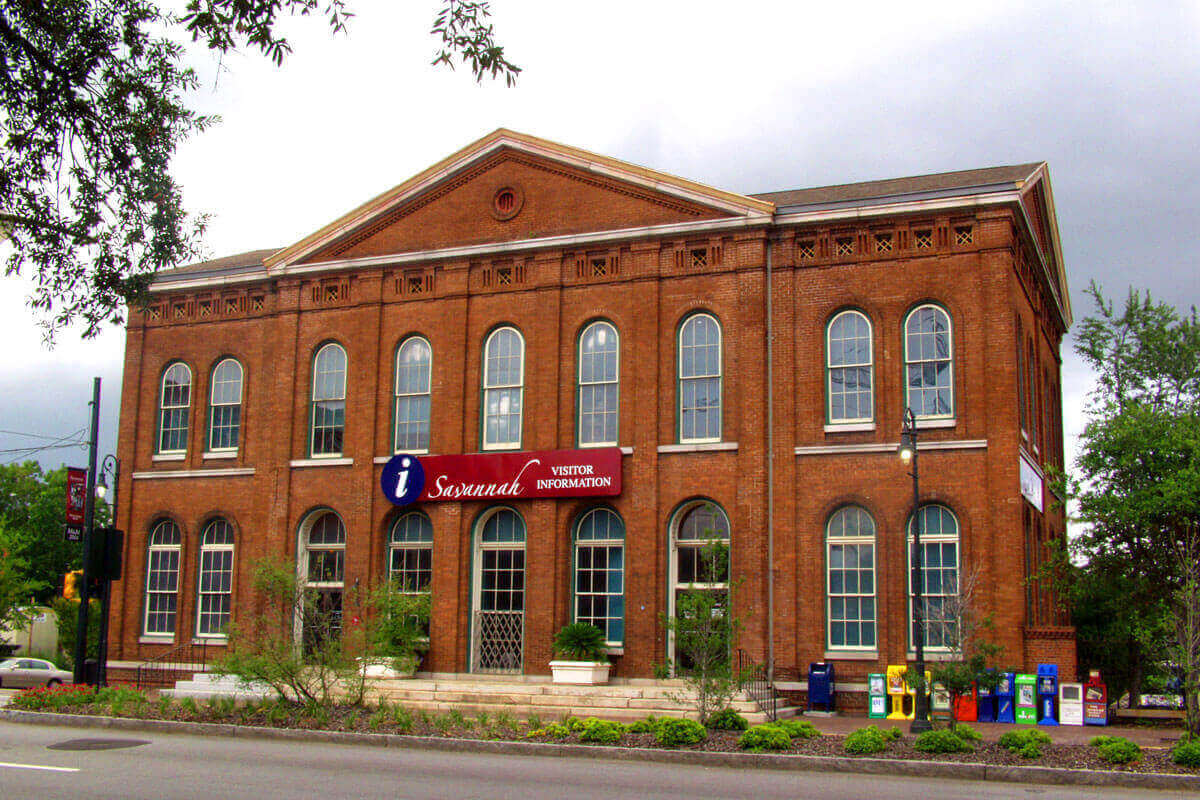
Housed inside a historic Central of Georgia Railway Passenger Station, The Savannah Visitor’s Center is the place to go to learn all about Georgia’s first city. You’ll receive a friendly greeting and have access to info, tour maps, brochures and refreshments. The staff is always delighted to assist guests with finding the most interesting and entertaining sites in the city.
Old Town Trolley Welcome Center
Attractions to explore near this stop
Share with your friends!
Attractions to explore near this stop
Eugene Tallmadge Bridge
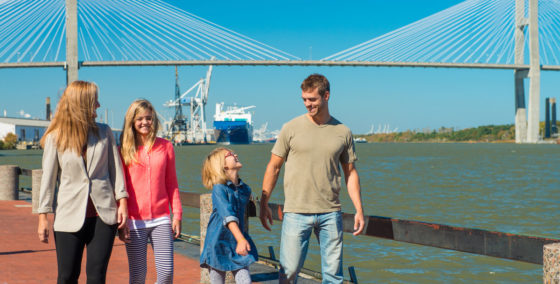
Eugene Talmadge held the office of Governor of Georgia four times in the 1940’s. He was elected again in 1946, but passed away before taking office. The Eugene Talmadge Memorial Bridge, named to honor the former politician, crosses over the Savannah River between Georgia and South Carolina. Originally built in 1953, the bridge was reconstructed in November of 1990 to accommodate the large ships entering the port in Savannah, the largest single terminal container port on the United States eastern seaboard.
City Market
Attractions to explore near this stop
Share with your friends!
Attractions to explore near this stop
American Prohibition Museum and Congress Street Up

Located in Savannah’s popular City Market, the American Prohibition Museum is the first and only museum in the United States dedicated to the history of Prohibition. Highlighting an era of gangsters, rum runners, and flappers, the museum brings the Roaring Twenties to life with over 20 intoxicating exhibits and an authentic speakeasy. Featuring 21st century technology and immersive displays, the museum takes guests on a journey through the past to the early 1900s when anti-alcohol rallies swept the nation and America’s struggle with alcohol was brought to light.
-
Admissions
-
Entertainment
-
Restrooms
Savannah Pirates and Treasure Museum
Trolley Gift Shop
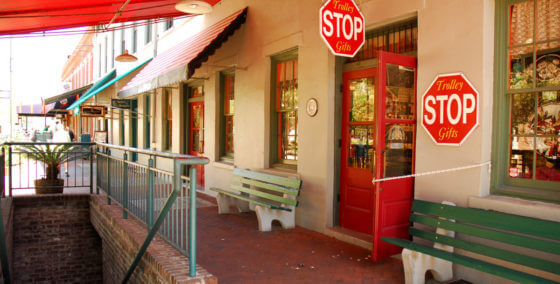
There’s no better time to pick up some memorable gifts for family and friends or even a special something for you. Stop in at Trolley Stop Gifts for a variety of gifts, souvenirs, stationery and more.
-
Shopping
 City Market
City Market
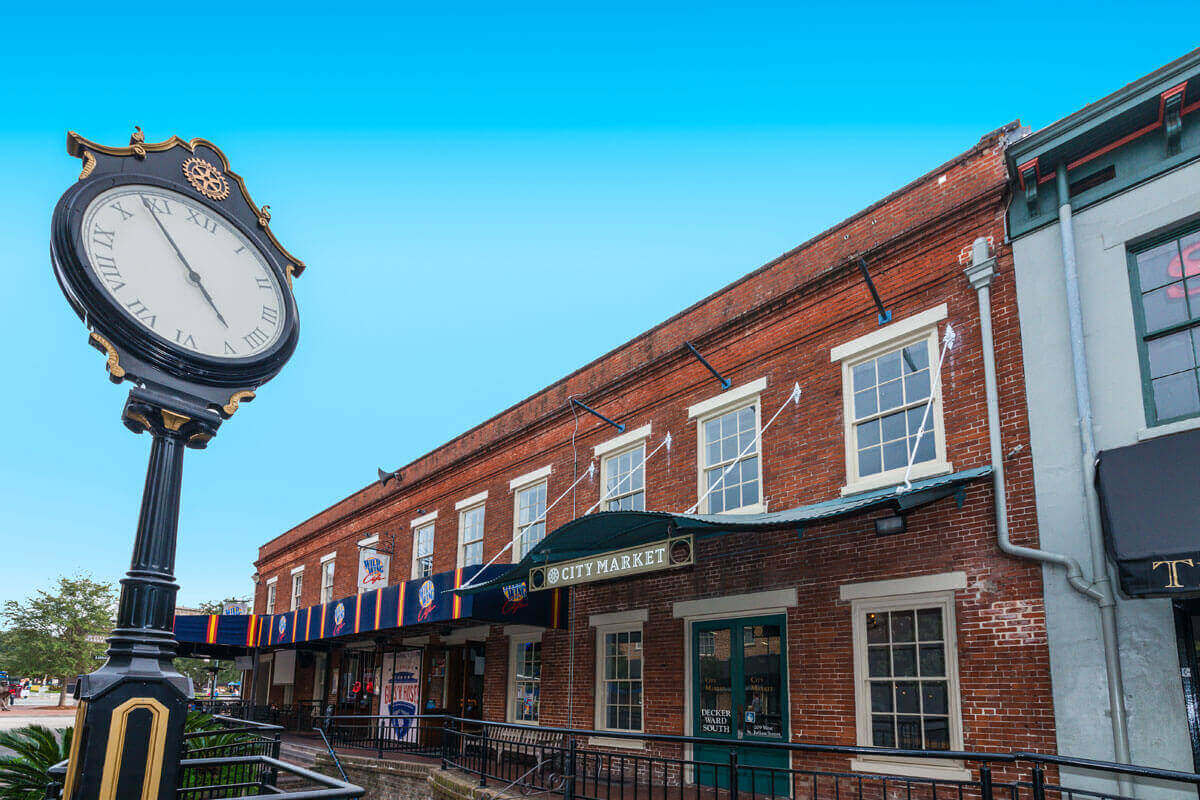
In the spirit of old Savannah, the historic City Market is alive and bustling, welcoming guests of all ages to enjoy its charming ambiance. In 1755, City Market was where fishermen and farmers brought their wares and where horse-drawn carriages brought people to meet, shop and socialize. Back then, it was Savannah’s social and commercial gathering spot. Though the original structures did not survive various fires, demolition and the eventuality of progress, a group of history enthusiasts worked to revive the City Market and due to their efforts, it is once again a center of activity.
-
 Shopping
Shopping -
 Dining
Dining -
 Entertainment
Entertainment
Christ Church Parish House
Attractions to explore near this stop
Share with your friends!
Attractions to explore near this stop
Lucas Theatre
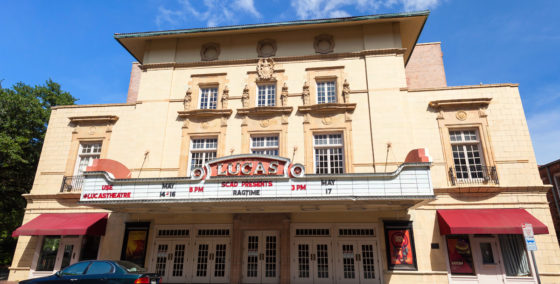
Arthur Lucas was a brilliant marketer. After the opening of his namesake theater in Savannah in 1921, he kept track of the wedding, birth and birthday announcements that appeared in the paper. Then, he sent free tickets to residents on their birthdays, anniversaries and as wedding and congratulations gifts. For more than 40 years, people from all across the city came to the Lucas Theater to see the various films, shows and concerts. After closing in 1976, the historic theater was threatened with destruction on several occasions.
-
Admissions
-
Restrooms
Savannah College of Art and Design Library
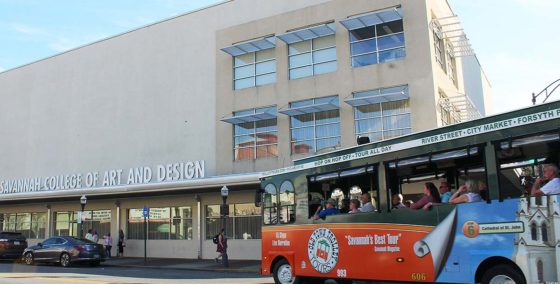
The Savannah College of Art and Design’s (SCAD’s) crown jewel for visual discovery and research is the Jen Library, located on historic Broughton Street. Nestled in the heart of downtown Savannah, Georgia, the Jen Library is a 85,000 square foot Art Deco-style building, acquired by the Savannah College of Art and Design in 1996. Renowned across the community as an architectural marvel, the former department store turned SCAD Library features large windows providing natural light to the entire space and a gorgeous glass staircase.
Wesley Monument
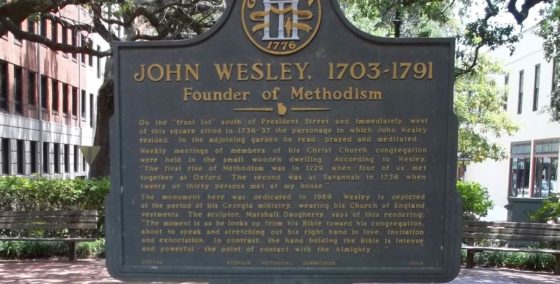
Known as the Father of Methodism, John Wesley is forever remembered in Reynolds Square in historic downtown Savannah. The monument constructed to honor him and his leadership of the Methodist Church stands in the center of the square. Many believe that this is the site of his residence and gardens and thus this is why it was chosen. Although Wesley only lived in Savannah for two short years, he was known for his religious ideals and for forming a Protestant sect that later became the Methodist Church.
City Hall
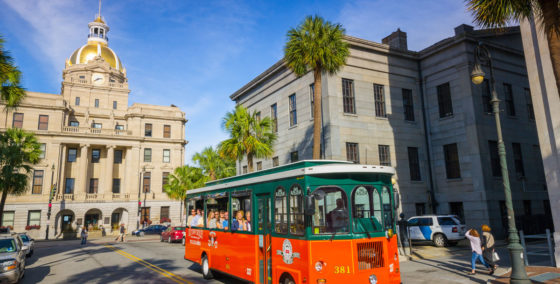
When the original design of the City Hall building inSavannah called for ornate statues of chariots and horses, the cost to build such a structure was around $200,000—a monumental sum in those days. To keep the cost down, the statues were excluded from the final plans and the Renaissance Revival building began to be constructed. Built in 1901, the structure replaced the original 1799 building and was an impressive sight located on Yamacraw Bluff. The first City council meeting took place in the then City Exchange Building on January 3, 1906. A spectacular architectural masterpiece, City Hall features a domed roof that rises 70 feet into the air.
-
Restrooms
Convention and Visitors Bureau
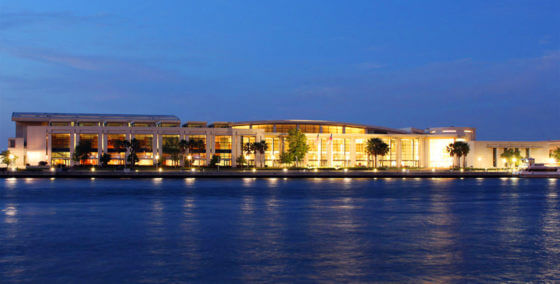
The Savannah Convention Center and Visitor’s Bureau, offers a stunning setting for conventions, meetings or special events. Located on the northern shore of the Savannah River, the Savannah International Trade and Convention Center provides breathtaking views of Savannah’s bustling waterfront in a world class facility. The center is more than 330,000 sq. ft and provides state-of-the-art amenities to visitors and attendees. The dazzling waterfront complex features exhibit and meeting space, including 13 meeting rooms, four executive board rooms, a 25,000 sq. ft. Grand Ballroom, and a high-tech auditorium.
-
Admissions
-
Restrooms
Cotton Exchange
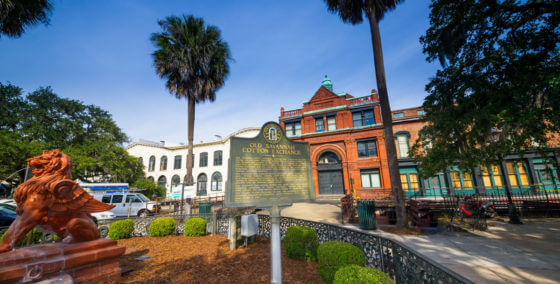
The Cotton Exchange was long a symbol of the importance of the cotton industry to the city of Savannah. The building on Bay Street was originally called King Cotton’s Palace and because of its Romanesque architectural style it stood out among the other buildings nearby. Today the historic building is a Solomon’s Masonic Lodge and is open to the public on special occasions. Visitors to the Central River Street area can enjoy the splendid view of the exterior of the building and the griffin, a winged lion of mythology that stands in front surrounded by a fence with medallions of poets and presidents.
River Street
Attractions to explore near this stop
Share with your friends!
Attractions to explore near this stop
Riverwalk
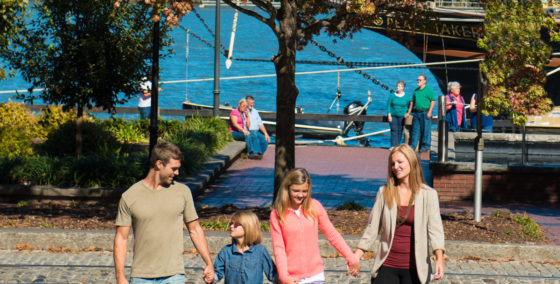
A stroll down Savannah’s Riverwalk is not only pleasing, it’s truly serene. Walk along the Savannah River; stop in for a bite at any of 21 restaurants, stroll through various Savannah museums nearby or simply enjoy the scenery as you head towards the adjoining River Street, just a short distance away. On River Street, in the heart of historic Savannah, you’ll find everything from sweets to teddy bears, Harley Davidson apparel, and art galleries housed inside restored Cotton Warehouses.
-
Shopping
-
Dining
-
Restrooms
Ghosts & Gravestones
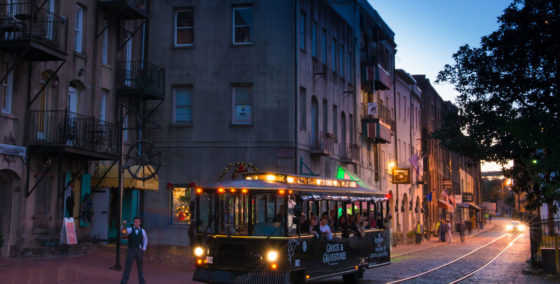
Unseen spirits stroll among the living in the streets and squares of Savannah – “America’s Most Ghostly City!” Hear the tales no other tours dare tell as shadows play tricks on your mind. Journey through time with EXCLUSIVE nighttime entry into TWO of Savannah’s most haunted venues.
-
Admissions
-
Entertainment
Simply Savannah
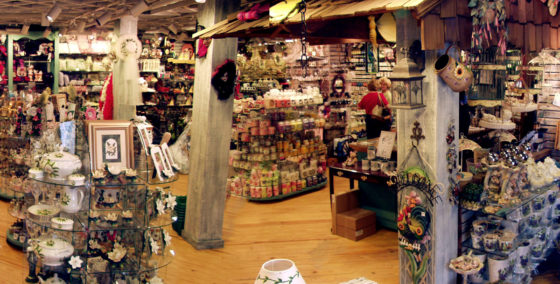
Simply Savannah is the gift shop for your entire one-stop shopping needs for all traditional southern souvenirs. A shoppers’ delight specializing in anything and everything Savannah and Georgia related from magnolias, Bird Girl statues, and dozens of books ranging in topic from guidebooks, cooking, “Midnight”, and ghosts.
-
Shopping
African-American Monument
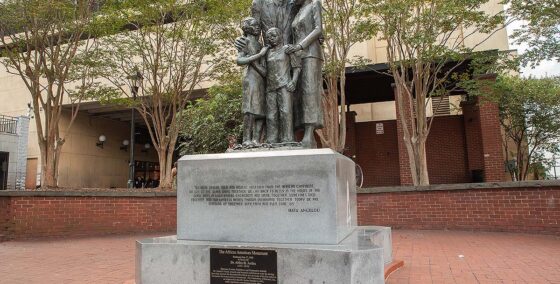
The African-American Monument on River Street was dedicated in 2002 to honor the strength and contributions of African-Americans in Savannah. The bronze sculpture shows a family standing together with broken chains at their feet, a symbol of freedom and resilience. The figures face both the Savannah River and the direction of Africa, tying past and present together. An inscription written by poet Maya Angelou accompanies the monument, offering powerful words of remembrance and hope.
Vietnam Veterans Monument
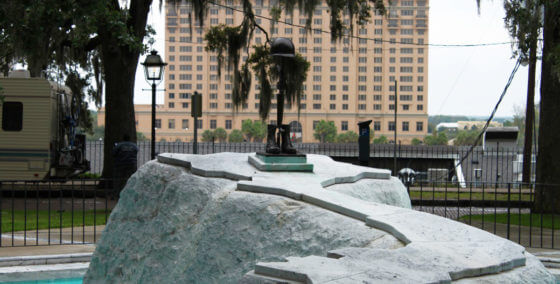
Another moving tribute found in Emmet Park, the Vietnam Veterans Memorial was placed in 1991 by the Vietnam Memorial Committee. A large reflecting pool is surrounded by steps and a marble base lists the names of the Chatham County soldiers who were killed in the Vietnam War. A replica of Vietnam sits in the center of the pool, while a bronze battlefield grave marker is mounted on top. Guests to the park who view the monument gain an understanding of the sacrifices the local Savannah soldiers made to serve their country.
River Street Market Place
Attractions to explore near this stop
Share with your friends!
Attractions to explore near this stop
Olde Harbour Inn
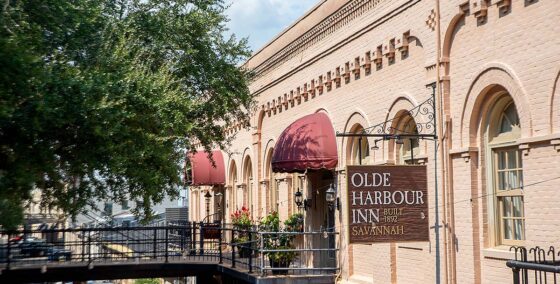
The Olde Harbour Inn blends Savannah’s history with modern comfort on the cobblestoned riverfront. Built in 1812 as a working warehouse, the building later became a boutique inn with spacious suites, exposed brick walls, elegant décor, and views of the Savannah River. Its location places guests right in the middle of the city’s lively waterfront, surrounded by shops, galleries, and dining.
Visitors enjoy evening wine receptions, thoughtful touches, and easy access to Emmet Park, just a short stroll away. The inn preserves the character of the past while offering modern comforts, giving guests a memorable way to experience Savannah’s historic district.
Emmet Park
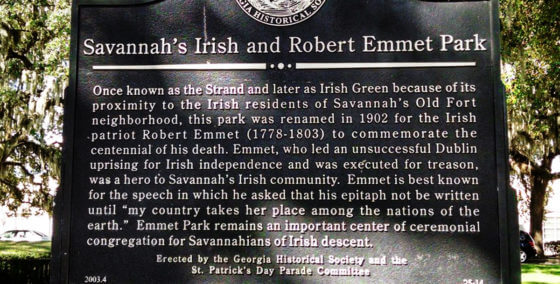
A beloved spot to many Irish residents and local Savannahians, Emmet Park was originally known as the Strand and the Irish Green. It’s located near a neighborhood that was home to many Irish Savannahians. In 1902, it was renamed Emmet Park as a tribute to Robert Emmet, an Irish patriot, who was considered to be a hero to Savannah’s Irish community. Several blocks long, Emmet Park is known for its thriving landscape which provides a beautiful shady setting. The park is historically significant to Savannah because of the variety of monuments and memorials. The Old City Exchange Bell is kept here and is all that is left from the City Exchange building which was destroyed by a hurricane.
Morrell Park/Waving Girl Statue
Attractions to explore near this stop
Share with your friends!
Attractions to explore near this stop
Olympic Torch
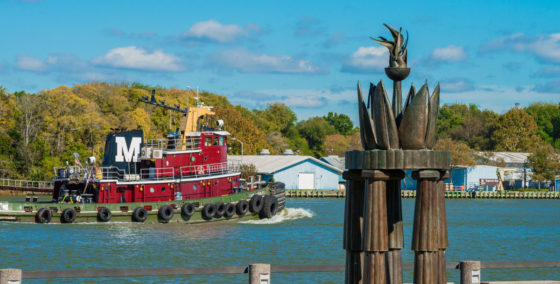
The Olympic Torch Sculpture on the riverfront is a touching monument that radiates the American spirit of victory and of athletic competition. The sculpture features an Olympic Torch surrounded by five columns that symbolize the five Olympic rings. Framing the flame are billowing sails that represent the sailboats in the Official Olympic Yachting events held in Savannah.
Colonial District
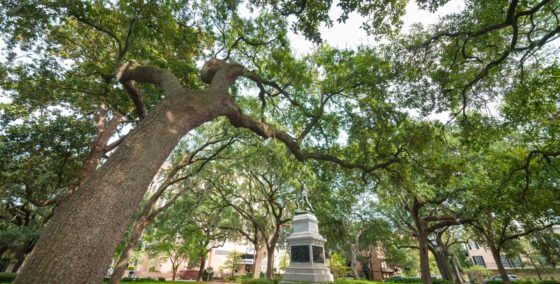
The scenery that inspires poets, writers and dreamers, the Savannah Colonial District is a memorable journey back to an era gone by. Cobblestone streets lead to traditional colonial homes, mansions and beautiful gardens. The aroma of gardenias and magnolias will sweetly awaken your senses as will the marvelous beauty of the largest Historic Landmark District in the United States. See many graciously restored homes, churches, parks and squares framed by hundred-year old oaks whose sweeping branches create an amazing setting. Imagine the life and times of the earliest Savannah settlers as you tour the original neighborhoods where their intriguing past comes to life.
The Pirate's House Savannah
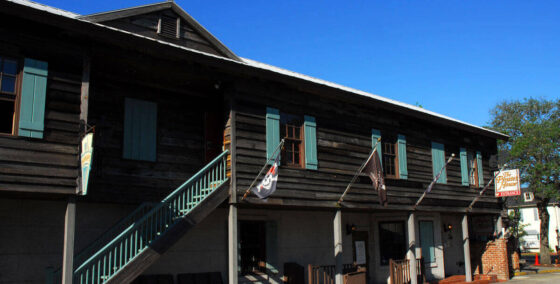
When you step into The Pirate’s House in Savannah, you’re not just entering a restaurant — you’re diving headfirst into Savannah’s rich maritime history. Located in the heart of Historic Downtown Savannah, this iconic spot offers guests a chance to experience the city’s colorful past while enjoying some of the best Southern cuisine around. With every meal served in its historic dining rooms, visitors can explore stories of adventurous seafarers and legendary pirates who once frequented the site. This iconic landmark blends its fascinating history with a distinctly seafaring ambiance and is a must-see destination for both locals and visitors.
-
Dining
-
Restrooms
Trustees Garden
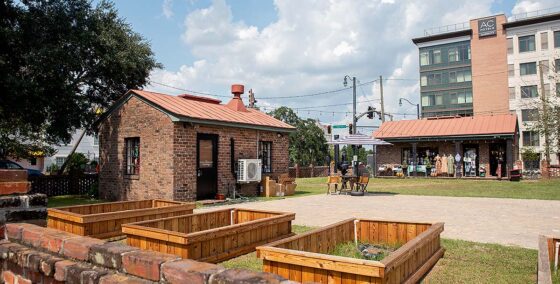
Trustees’ Garden was established in the 1730s by General James Oglethorpe and is recognized as America’s first experimental agricultural garden. Covering ten acres, it was created to test crops that might thrive in the new colony, including mulberry trees for silk, along with cotton, indigo, peaches, and medicinal plants. Silk production never took root, but the garden helped introduce peaches and cotton, which later became central to Georgia’s farming. Over the centuries, the site has served many purposes, yet its legacy continues to connect Savannah to its earliest years and the founding of the colony.
 Morrell Park/Waving Girl Statue
Morrell Park/Waving Girl Statue
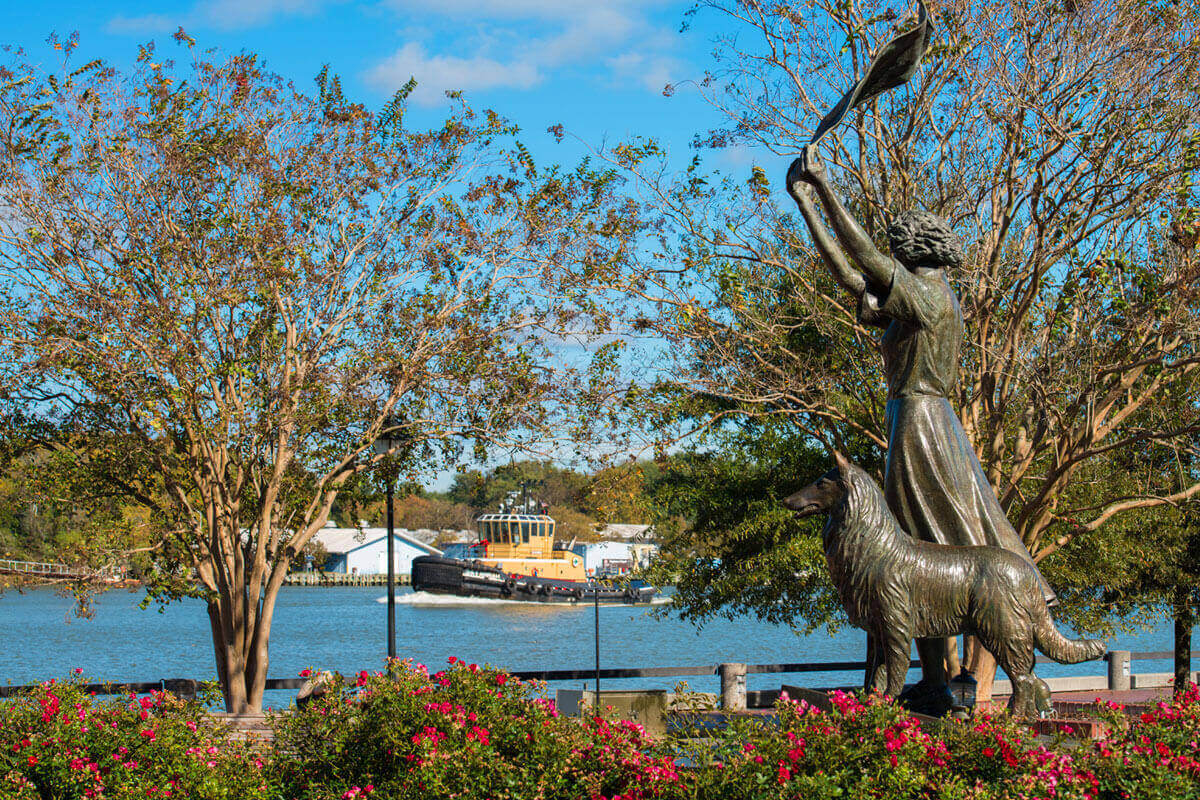
Florence Martus embodied the true spirit of Southern Hospitality. For forty-four years she greeted every ship entering the Savannah port by waving a cloth from her home on Elba Island. She was the sister of the Elba Island light-keeper and from 1887 to 1931 she was well-known for her welcoming persona. The Waving Girl Statue by Felix De Weldon, stands in Morrell Park on the Riverfront in tribute to Florence.
Davenport House
Attractions to explore near this stop
Share with your friends!
Attractions to explore near this stop
Colonial Park Cemetery
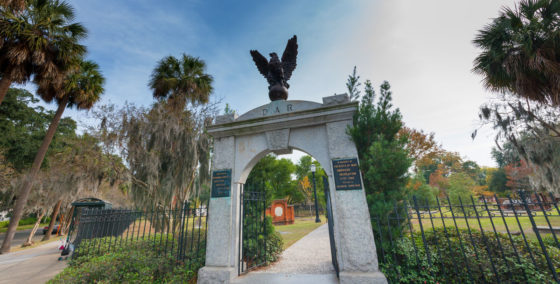
The Colonial Park Cemetery has been a part of Savannah history for more than two centuries. From 1750 until 1853, most residents who died in the area were buried in this shaded, moss-draped cemetery. Among them are various prominent people including Revolutionary War Soldiers. When visitors walk through they can see some of the oldest gravestones in the Southern United States. And they can experience the history that lives within these grounds.
Kehoe House
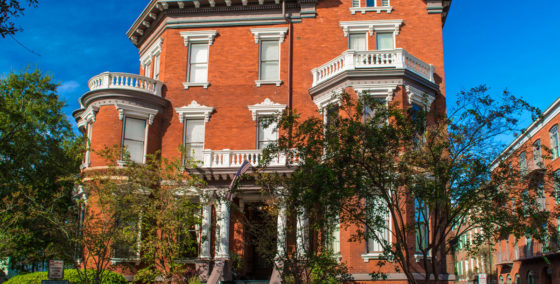
Another gem among the many exquisite historic places in Savannah, the Kehoe House has been meticulously restored to capture its original 1892 glamour. The Renaissance Revival mansion is located in Savannah’s historic district and is now an opulent boutique hotel. Listed on the National Register of Historic Places, the hotel was once the home to William Kehoe and his family.
-
Admissions
-
Dining
-
Restrooms
Telfair Owens-Thomas House
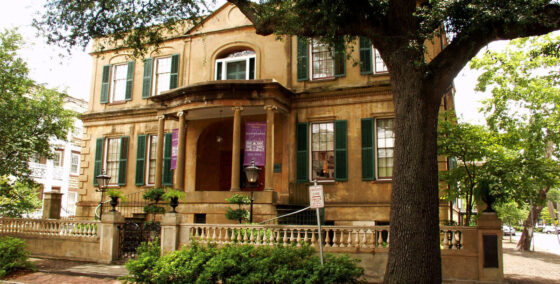
The Owens-Thomas House stands as a prime example of early 19th-century Regency architecture, showcasing the visionary talent of architect William Jay. This historic mansion, completed in 1819, captivates visitors with its unique design — featuring curvilinear walls, Greek decorative motifs, elegant stained-glass panels and meticulously crafted furniture — each element contributing to its status as a masterpiece of architectural design. Throughout its history, the residence has transitioned from a private home, initially belonging to the affluent merchant Richard Richardson and later to the esteemed lawyer George Welshman Owens, to its current function as a museum managed by the Telfair Academy of Arts and Sciences since 1954.
-
Admissions
Rainbow Row
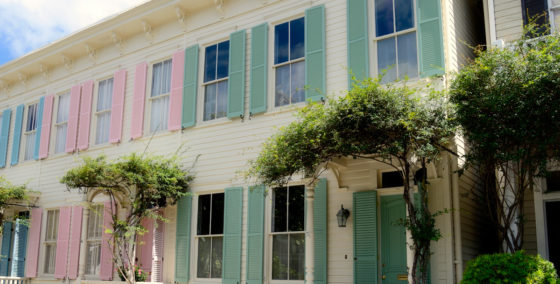
Located in Savannah’s Landmark Historic District one block from River Street, Rainbow Row is a collection of charming Carpenter Italianate-style row homes. Just off Washington Square, each unit features Victorian-era details, a courtyard and a unique color scheme that embodies the ambiance of old Savannah. These distinctive properties are within easy walking distance of the Old Pink House.
Leopold’s Ice Cream
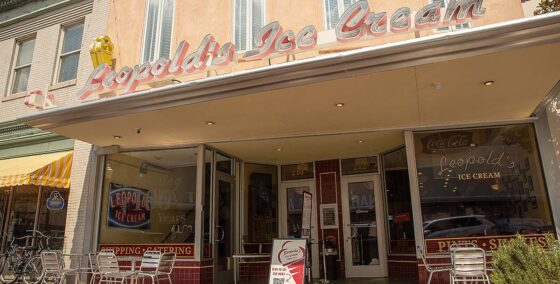
Leopold’s Ice Cream has been a Savannah favorite since 1919, when three brothers from Greece opened their soda fountain in the city. Locals loved the shop’s malts, milkshakes, banana splits, and the famous Tutti Frutti flavor that became a signature treat. Before long, Leopold’s became a regular stop after concerts, school games, and dances, making it part of everyday life in Savannah.
Famed songwriter Johnny Mercer grew up just a block away, worked at the shop as a boy, and stayed a devoted customer for the rest of his life. Today, Leopold’s still serves ice cream from the original family recipes in a setting filled with music, movie memorabilia, and the feel of a classic soda fountain.
-
Dining
-
Restrooms
 Davenport House
Davenport House
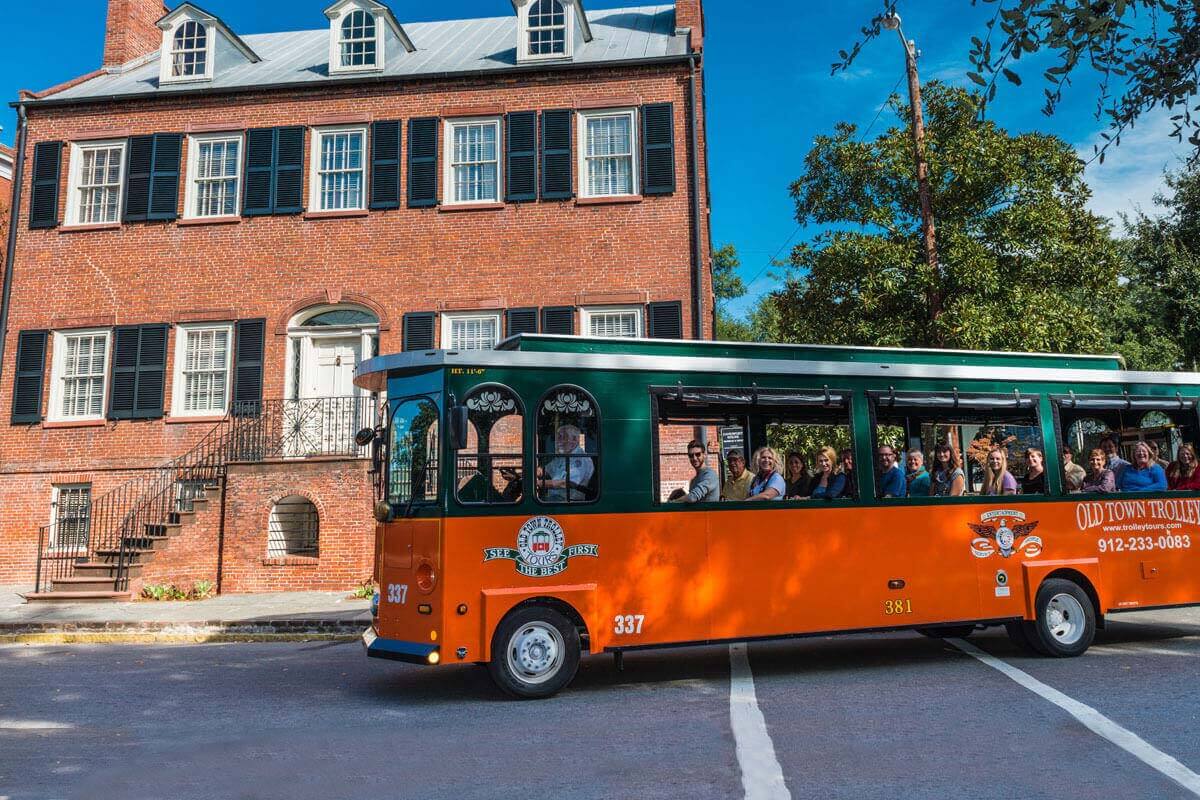
The Davenport House is a Federal-style house that was constructed in 1820 by master-builder Isaiah Davenport. Davenport was known for his skill and talents in the building industry and the house served as a showcase of his work as well as a family home. He lived in the house with his wife and family until he passed away from yellow fever in 1827. When threatened with demolition in the mid 1950’s, seven Savannah women got together to save the Davenport House and found Historic Savannah Foundation.
-
 Admissions
Admissions -
 Restrooms
Restrooms
Cathedral of St. John The Baptist
Attractions to explore near this stop
Share with your friends!
Attractions to explore near this stop
Flannery O'Connor House
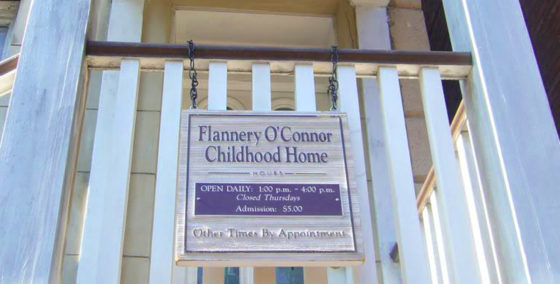
Born as Mary Flannery O’Connor in 1925, the beloved southern author dropped her first name when she entered college and became known as just Flannery. Her childhood home is now a house museum where visitors can get a feel for the life she led before she became famous. The three-story home offers a quaint atmosphere where lectures, readings and other programs that relate to O’Connor’s best-known works are held.
First Girl Scouts USA Headquarters
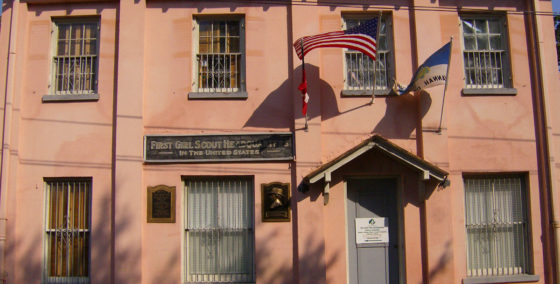
What Makes the Original Girl Scouts Headquarters an Important Stop?
The original Girl Scouts headquarters is a special place in Savannah’s historic district and an important stop for anyone curious about American history. Visitors come to see where the early chapters of the organization began, and the quiet setting helps explain how the movement grew over time. The building sits on a peaceful street beside the Andrew Low House, which helps guests understand how closely the two sites are connected. Many people add it to their list of popular Savannah museums since it offers a clear look at the group’s early years and the role the city played in its development. A visit here introduces the mission of Juliette Gordon Low and shows how her ideas encouraged young girls to build confidence, learn new skills, and support each other.
Andrew Low House
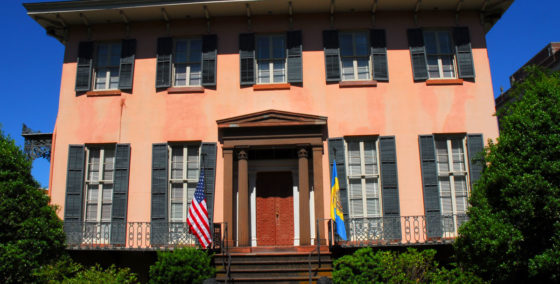
Built in 1848 for Andrew Low, a wealthy cotton merchant from Scotland, the Andrew Low House is a classic and elegant Savannah mansion. Facing Lafayette Square, its stucco and brick design meshes beautifully with the rich history of the area. The house itself has a colorful and interesting past, as several prominent people often visited the Low family during their residency; Robert E. Lee and William Makepeace Thackeray to name a few.
-
Admissions
-
Restrooms
 Cathedral of St. John The Baptist
Cathedral of St. John The Baptist
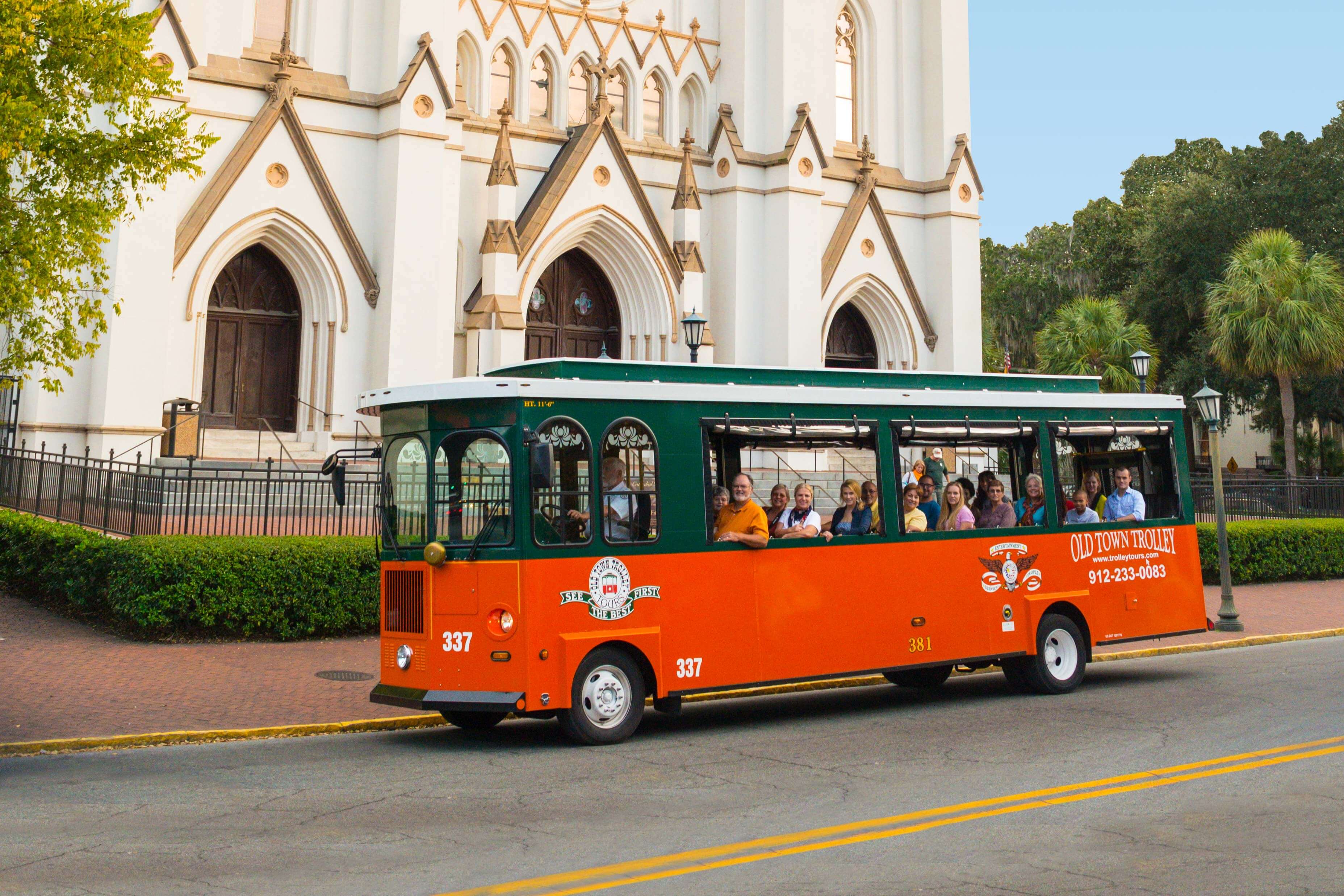
A glorious Savannah attraction to behold, the Cathedral of St. John the Baptist is an architectural masterpiece and the seat of the diocese of Savannah. In the French-Gothic style, pointed arches and magnificent details make a breathtaking backdrop to the gorgeous Savannah skyline. It was founded in 1700 by the first French Colonists and although the original early structures were destroyed by fire, the current cathedral dates back to 1874.
Visitors can take a self-guided tour of the cathedral, enjoying the amazing Twin Spires and picturesque exterior as well as the Italian marble, Austrian stained glass and opulent Persian rugs of the interior. On any day of the year, a stop at the Cathedral of St. John is a fantastic experience.
-
1Old Savannah DistillerySTOP
-
2Franklin SquareSTOP
-
3Juliette Gordon Low Birthplace MuseumSTOP
-
4Madison SquareSTOP
-
5Forsyth ParkSTOP
-
6Taylor SquareSTOP
-
7Ralph Mark Gilbert Civil Rights MuseumSTOP
-
8Visitors CenterSTOP
-
9Old Town Trolley Welcome CenterSTOP
-
10City MarketSTOP
-
11Christ Church Parish HouseSTOP
-
12River StreetSTOP
-
13River Street Market PlaceSTOP
-
14The Waving GirlSTOP
-
15Davenport HouseSTOP
-
16Cathedral of St. John The BaptistSTOP

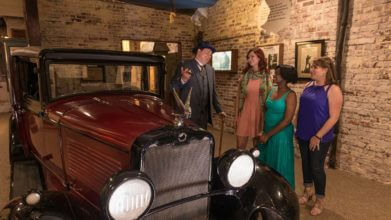
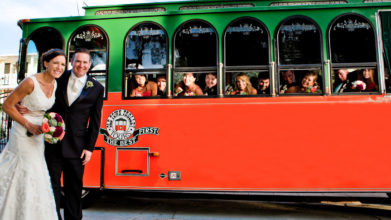
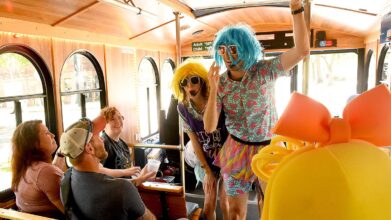
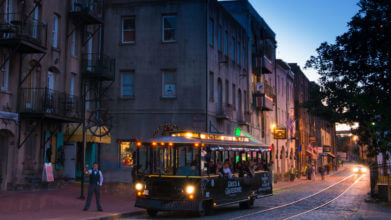




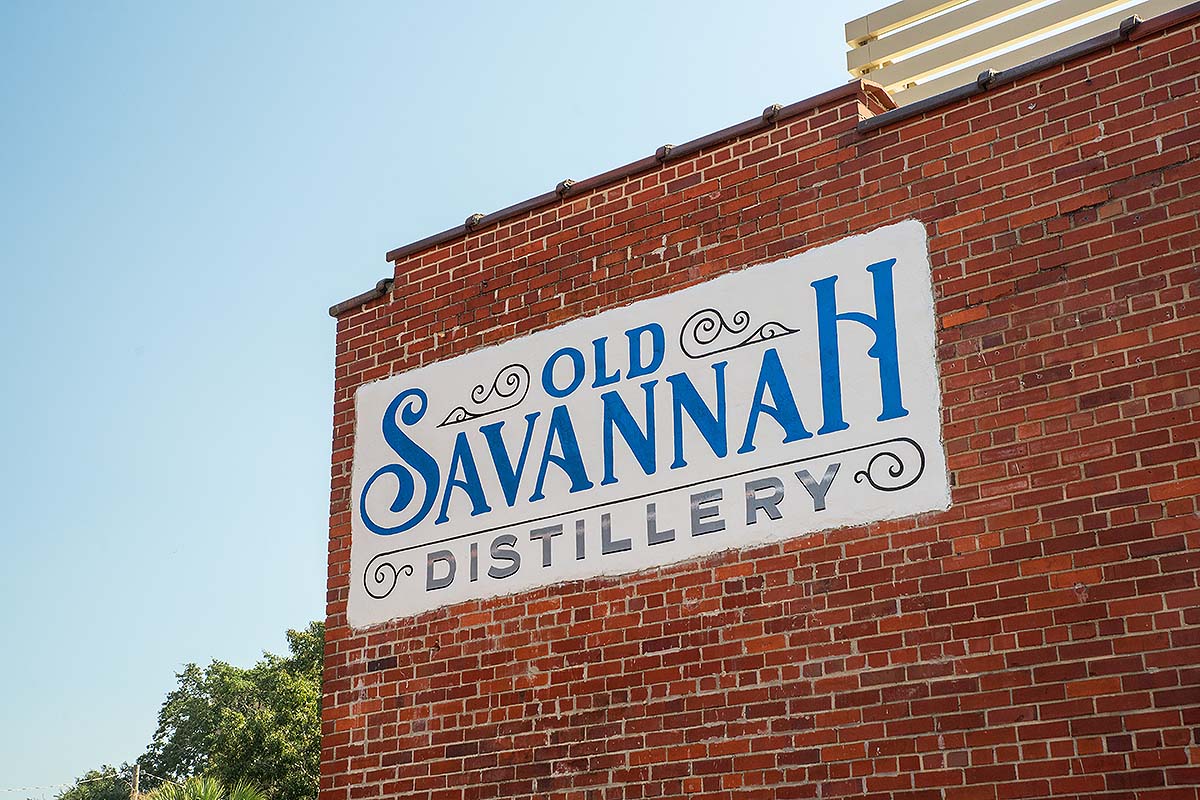
 Shopping
Shopping  Entertainment
Entertainment  Restrooms
Restrooms  Admissions
Admissions 
 Dining
Dining 
